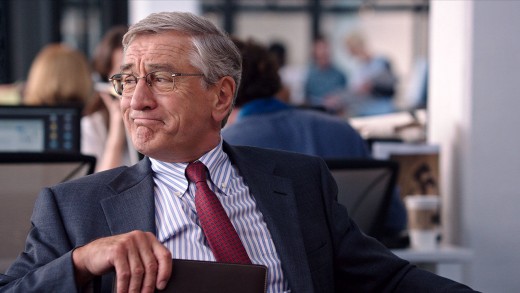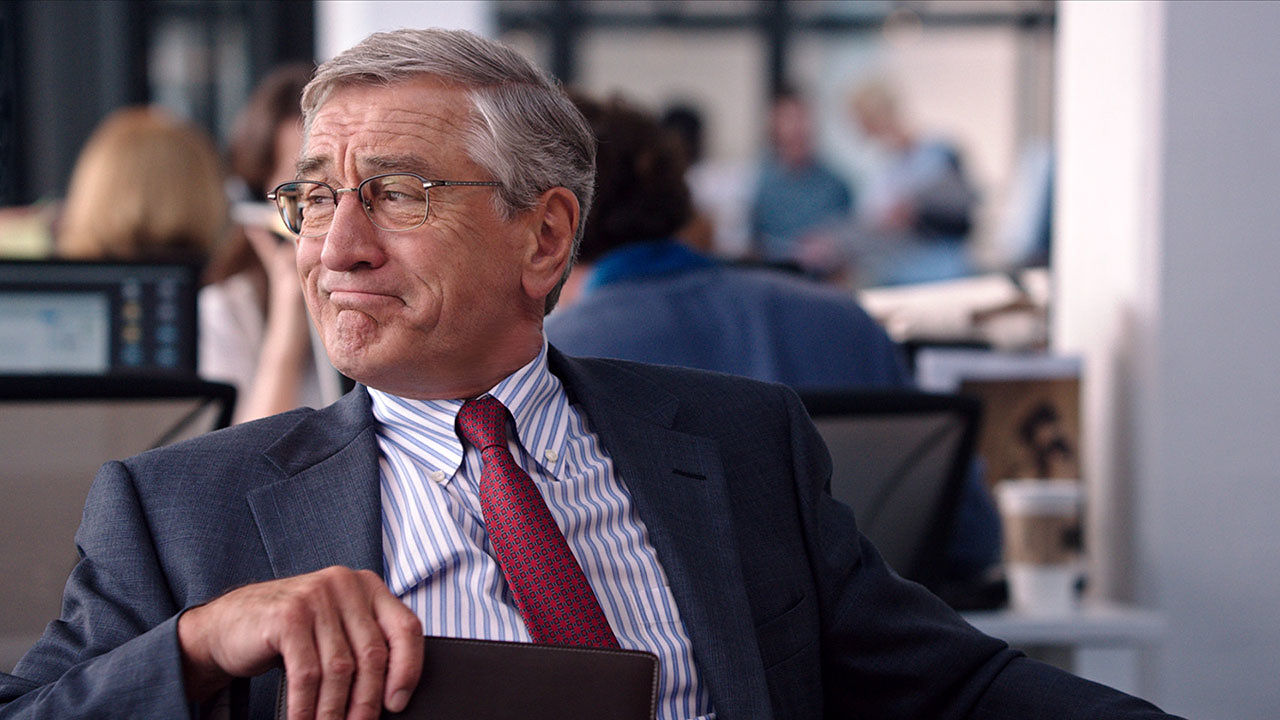“The Intern”‘s Traditional Business Lessons For A Modern Workplace
Nancy Meyers’s new movie demonstrates how a generational gap in the office might offer the opportunity to apply experience to enthusiasm.
Perhaps you’ve heard that this is an historic moment in the workplace. For the first time, five generations—traditionalist (born before 1946), boomer, gen X, millennial, gen Z (born after 1997)—can potentially work together now that college is changing and dropouts are just as capable of starting and running successful businesses and retirement is no longer affordable.
Organizational psychologists and human-resources experts often sound the alarm that generations can and will clash, that they have differing opinions on everything from diversity to soft skills, and such conflict needs to be kept in check in order to achieve harmony and productivity.
One person seems to have it all figured out. And she’s neither an academic, nor a workplace expert. It’s Hollywood director, producer, and screenwriter Nancy Meyers, and she tackles the generation gap in her latest offering, The Intern.
Meyers, no stranger to navigating unconventional workplace waters (think: Private Benjamin and Baby Boom) opted to place a 70-year old retiree in the entry-level spot at an e-commerce startup in Brooklyn in her new film. Though there are some funny moments, for the most part, Meyers relies less on obvious cultural reference gags and more on a subtle difference in soft skills that DeNiro’s character Ben Whitaker has honed through 40 years of being a “company man.”
Meyers, herself a boomer hovering at the age formerly known for retirement, focused more on old-school business practices to illustrate the marked differences between the workplace of Ben’s day and the one he’s currently trying to navigate at the startup.
Dress For The Job You Want
One of the first, most obvious generational differences is that Ben wears a suit. From his video interview (the company eschews cover letters and resumes), to his in-person meeting with talent acquisition, to his first and subsequent days on the job, Ben mines his copious selection of suits, ties, and dress shirts to look his professional best.
Even when his boss (Anne Hathaway’s character Jules) tells him he doesn’t need to dress up for the office and his younger coworkers comment on his attire, Ben sticks to his guns, claiming there is comfort in the corporate uniform he wore for so many years.
Along the way, Meyers, who’s been critical of the fact that most men today dress more like children than adults, lets apparel choices send a message that perhaps it is better to dress up than down. Science has indicated that certain clothing can systematically influence the wearer’s psychological processes and productivity.
The Value In Company Loyalty
It’s well documented that a career like Ben’s that spanned four decades has disappeared with the rise of technology. According to the U.S. Bureau of Labor Statistics, U.S. workers stay in one job an average of 4.6 years, and only 13% of millennials believe workers should keep a job for five years.
That doesn’t leave much room for building loyalty. Though it may be heavy-handed at times, Ben’s character shows time and again that an employee planning to stick around has benefits for the business. He begins by demonstrating graciousness to every single person he comes in contact with, even when he’s confronted by ageist questions like, “Where do you see yourself in 10 years?”
Between helping the mail clerk with deliveries when he’s not assigned any work, to empathizing with Jules’s overworked assistant when she complains of working 14-hour days and getting no recognition ( with a simple “I hear you, that’s frustrating”), Ben is not only congenial, he’s making everyone feel like they’re worth more than the sum of their job descriptions. Calling Jules’s assistant “boss” wasn’t a move to curry favor, but instead worked to make the 24-year-old feel like she was in charge and motivated her accordingly.
Building social capital was particularly important in jobs where tenures stretched across decades, but it’s no less valuable in today’s environment where jobs are often won on relationships, and you can end up working with the same people at different jobs.
Watch And Learn
Onboarding new employees is an oft-discussed practice, but actual apprenticeships rarely occur in a meaningful way as career trajectories pivot and people reinvent themselves. Ben’s rise through the ranks at the phone-book publisher rooted him in a practice of watching and learning in order to know where to be the most valuable.
Even without assignments, Ben kept paying attention to Jules and stepped in where he felt he could accomplish something—even when it was as simple as clearing a table of detritus left by multiple employees.
Office Confidential
Watching and listening has its downsides when office politics and managerial rumblings are the subject. When Ben overhears a conversation about hiring a new CEO, he keeps it close to his chest, claiming age-impaired hearing. Telephone conversations he overhears when he steps in to be Jules’s driver don’t go past the sedan’s front seat.
That’s not to say people didn’t gossip or get drunk with colleagues 30 years ago. Watercooler conversation and three-martini lunches came up in the age of Mad Men. But Ben’s learned to hold tightly to beans that are not his to spill in effort to keep a professional polish during the business day.
Although Ben is a model corporate citizen in Meyers’s hands, he’s got one more quality that is unlikely to be a product of his former career: He’s a feminist. You could argue that boomer men witnessed the fight for women’s lib firsthand, and that has informed his behavior. But Meyers points back several times to the fact that the modern workplace hasn’t come as far as we might think it has when Jules exhausts herself by trying to “have it all”: steering the company and trying to be a good mother.
Ben, ever the observer, hears her mention that the stay-at-home mothers who have children in her daughters’ class are quick to judge her for choosing to work full-time and have a stay-at-home husband handling the daily responsibilities of childcare. So when he’s sitting in the park with some of these other women, he launches into a spiel about how badass Jules is. “You must be so proud to have one of your own breaking the glass ceiling every day,” he says to the two who look about as shocked into agreement as they could be.
The Intern may not have gotten the landscape of today’s tech startup exactly right, but Meyers has made a valiant effort to prove that there are some things from the past worth keeping.
Fast Company , Read Full Story
(138)














